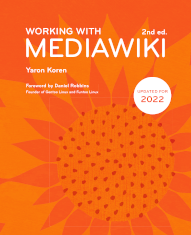Foreword
What exactly is a wiki, and why should you care about them?
A 'wiki' is a website that contains information, which allows users to edit its content easily. Wikis use what is called 'wikitext', which allows authors to define chapters, sections, paragraphs, hyperlinks and other elements of their content using a special short-hand. The wiki software then renders the resultant wikitext as a web page. Wikis can be open to the public, such as Wikipedia, or can be set up within companies and organizations and used internally to organize information. You can read them like normal websites and also easily help to improve the quality of the information they contain by editing their content.
So, why are wikis important? Before answering this, let's first quickly explore another topic – the prevalence of the search engine in our modern age. No doubt, you've used Google and other search engines to search for information that is important to you. We live in an information age that is both a blessing and a curse – a blessing because there is so much information freely available online, and a curse because the information is often of questionable quality or usefulness, or is poorly organized.
We've all come to appreciate the ability of a search engine to find information that is useful to us. When you search, you may have noticed that some of the best search results it has found for you have directed you to sites such as Wikipedia, which is powered by MediaWiki.
Aha! And this is why wikis are important. For a search engine to be useful, there needs to be quality, well-organized information somewhere on the Internet. Wiki technology is important because it facilitates the creation of these well-maintained, rich repositories of information – repositories that are improved by a large community of people, and are of benefit to an even larger community. Because wikis facilitate collaboration on a grand scale, they can help us all cope with the challenges of the information age.
But why might a wiki be important to you, personally? In our information age, those who succeed are often those who collaborate best. This is a subject that is close to my heart. I am known as the creator of Gentoo Linux, and the current "Benevolent Dictator for Life" of Funtoo Linux. Both are Open Source projects that depend upon collaboration to be successful.
I have had much success using MediaWiki for Funtoo Linux, and the Funtoo Linux wiki has played a part in encouraging Gentoo Linux to embrace wikis. They now also use MediaWiki, and I am happy to say that their wiki has grown to be an incredible resource for the Gentoo Linux community. Collaboration can be contagious, and good.
Since you are reading this book, there is a good chance that you find yourself in a position where you need to improve collaboration within your community or organization. The good news is that MediaWiki is an excellent solution for these types of challenges. It is Open Source software that is freely available to you, and is continually improved and supported by a strong community of developers.
In this book, you will learn how to set up MediaWiki and use it as a tool to infuse collaboration and tame the chaos of your complex informational landscape. With MediaWiki, this is not only possible, but also quite a bit of fun. You are in for a grand adventure.
Daniel Robbins
